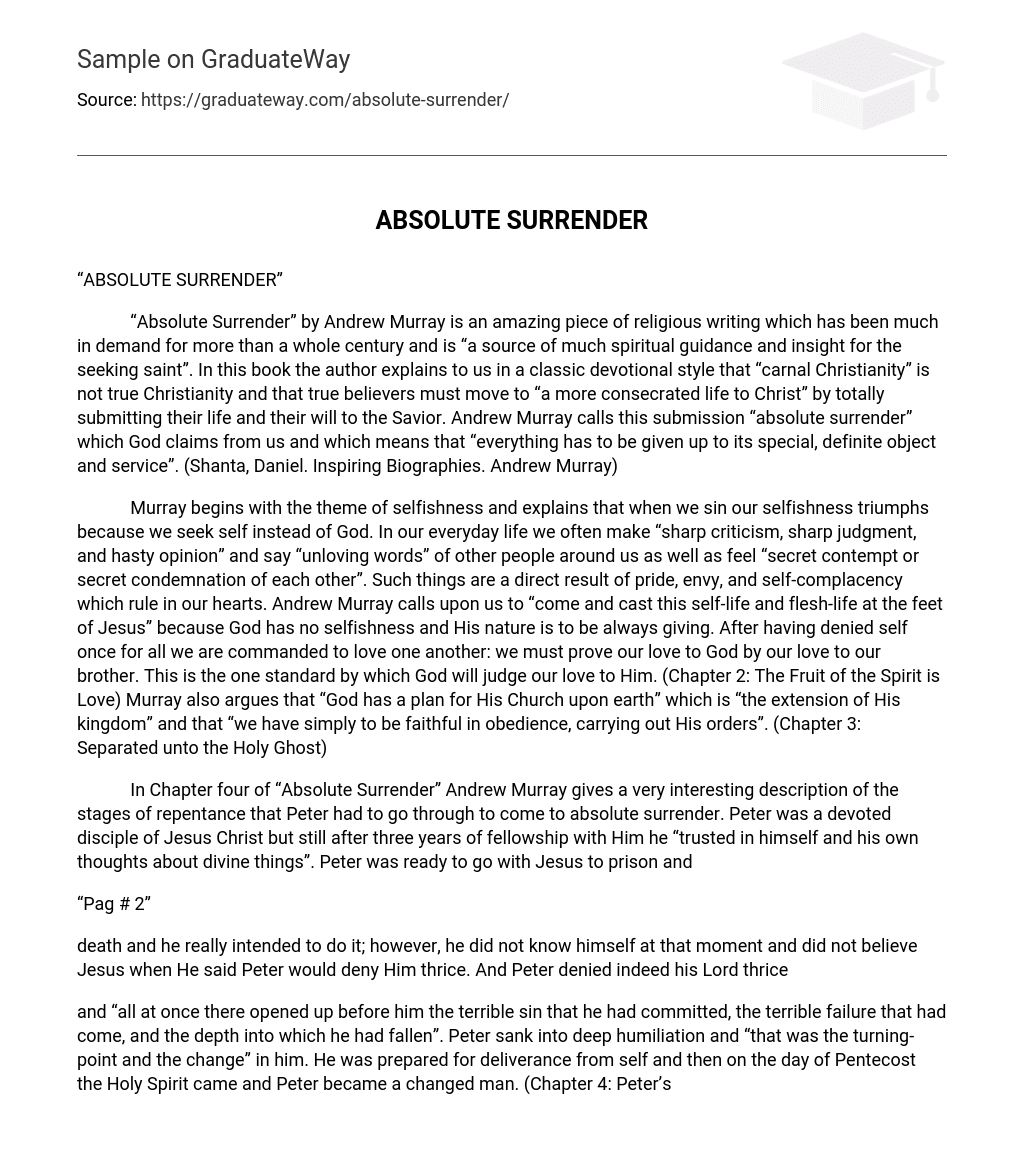“Absolute Surrender” by Andrew Murray is an amazing piece of religious writing which has been much in demand for more than a whole century and is “a source of much spiritual guidance and insight for the seeking saint”. In this book the author explains to us in a classic devotional style that “carnal Christianity” is not true Christianity and that true believers must move to “a more consecrated life to Christ” by totally submitting their life and their will to the Savior. Andrew Murray calls this submission “absolute surrender” which God claims from us and which means that “everything has to be given up to its special, definite object and service”. (Shanta, Daniel. Inspiring Biographies. Andrew Murray)
Murray begins with the theme of selfishness and explains that when we sin our selfishness triumphs because we seek self instead of God. In our everyday life we often make “sharp criticism, sharp judgment, and hasty opinion” and say “unloving words” of other people around us as well as feel “secret contempt or secret condemnation of each other”. Such things are a direct result of pride, envy, and self-complacency which rule in our hearts. Andrew Murray calls upon us to “come and cast this self-life and flesh-life at the feet of Jesus” because God has no selfishness and His nature is to be always giving. After having denied self once for all we are commanded to love one another: we must prove our love to God by our love to our brother. This is the one standard by which God will judge our love to Him. (Chapter 2: The Fruit of the Spirit is Love) Murray also argues that “God has a plan for His Church upon earth” which is “the extension of His kingdom” and that “we have simply to be faithful in obedience, carrying out His orders”. (Chapter 3: Separated unto the Holy Ghost)
In Chapter four of “Absolute Surrender” Andrew Murray gives a very interesting description of the stages of repentance that Peter had to go through to come to absolute surrender. Peter was a devoted disciple of Jesus Christ but still after three years of fellowship with Him he “trusted in himself and his own thoughts about divine things”. Peter was ready to go with Jesus to prison and
“Pag # 2”
death and he really intended to do it; however, he did not know himself at that moment and did not believe Jesus when He said Peter would deny Him thrice. And Peter denied indeed his Lord thrice
and “all at once there opened up before him the terrible sin that he had committed, the terrible failure that had come, and the depth into which he had fallen”. Peter sank into deep humiliation and “that was the turning-point and the change” in him. He was prepared for deliverance from self and then on the day of Pentecost the Holy Spirit came and Peter became a changed man. (Chapter 4: Peter’s Repentance)
By describing Peter’s repentance Andrew Murray argues that there are many earnest, godly, and devoted believers “in whom the power of the flesh” is very strong. They “must either deny self” which is “under the power of sin” or “deny Christ”. We can’t serve God partly and only one of those two great powers must “rule within us”. “And the Christ who led Peter to Pentecost is waiting today to take charge of every heart that is willing to surrender itself to Him.” (Chapter 4: Peter’s Repentance) Finally, Murray cites the parable of the Vine and the Branches, in John 15:5, to show our relationship to Jesus Christ. “The branch grows out of the vine” and “there it lives and grows, and in due time, bears fruit”. Inspired by God, our work must be “the brightest and most heavenly thing upon earth”. (Chapter 9: Ye are the Branches)
Keeping in mind Murray’s “Absolute Surrender” and looking carefully at the world around us we can perceive many signs of “self” in our everyday life. Our thoughts and our acts are often kept busy with our own work. We always have our selfish opinions of people and things around us. Today’s fast moving world is based on the self-life, self-comfort, self consciousness, self-pleasing, and self-will. We are occupied more with our work and a relentless pursuit of success than we are with prayer. However, regardless of all our achievements or successes very few of us feel completely happy and satisfied with their life. Murray explains that this is because of lack of faith in believers which is rest, joy, and victory. And even those among us who understand well the problem of “self” often find it difficult or impossible to depart from their ambitions and “the spirit of the world” and do not allow “the spirit of God” to come in and take possession of their inner
“Page # 3”
life. Perhaps our world could become much better and happier if we managed to switch our attention, efforts, and love from our self to our brothers and sisters in Christ.
BIBLIOGRAPHY:
Murray, Andrew. Absolute Surrender, http://www.hissheep.org/books/surrender.html (November, 25 2005)
Shanta, Daniel. Inspiring Biographies. Andrew Murray, http://www.comprehensivechristian.com/AndrewMurray.html (November, 25 2005





